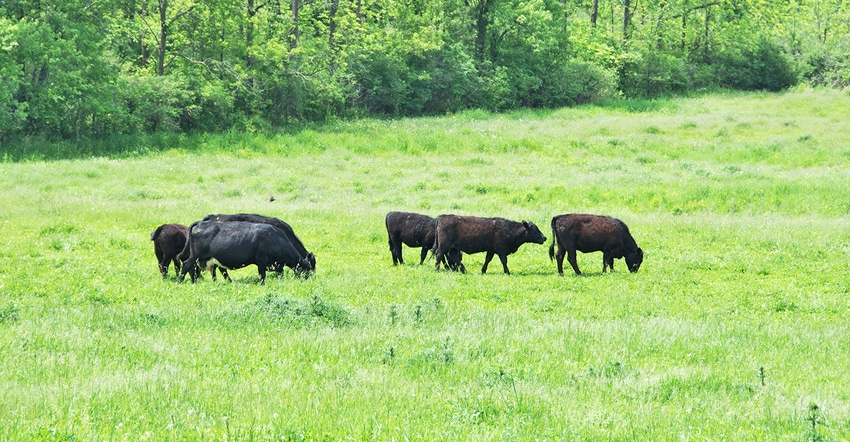January 26, 2017

Tall fescues growing in many Missouri pastures need endophyte fungus to survive — but not the toxins that go along with it and end up poisoning beef herds. Farmers can keep the fescue, but not the toxins, by replacing tall fescue with nontoxic varieties.
The fungus — called an endophyte because it grows inside the plant — is essential for fescue survival.
The bad news is that the endophyte found in K-31 fescue produces an alkaloid. That toxin costs Missouri beef producers $180 million in lost production. That's every year.
Sarah Kenyon, University of Missouri Extension regional agronomist, says losses in cow herds include lower conception rates, reduced milk production, reduced feed intake, rough hair coat, increased core body temperatures in summer and lower blood circulation in winter.
The first and most noticeable loss seen was what became known as "fescue foot." That's when feet freeze and hooves fall off, leaving bloody stumps. Animals that can't walk must almost always be put down.
Fescue foot is very visible. Unfortunately, more widespread and less noticed are other losses, especially low conceptions and gains, says Craig Roberts, MU Extension forage specialist.
How they found the infection
It took decades to discover those internal fungi are not created equal. Fungi that grows between cell walls in tall fescue plants are difficult to see, even with high-powered microscopes.
Plant scientists now know — and all grassland farmers should know — that the fungus in Kentucky 31-variety tall fescue is a bad one: the worst.
Losses from bad endophyte, which is found in most fescue pastures across the Southeast United States, cost $600 million each year to the beef industry alone.
Spreading the word
Roberts is active in the Alliance for Grassland Renewal, which has worked across Missouri and now works nationally, and he travels the country speaking on toxic fescue replacement.
For four years, the AGR held schools in Missouri.
Now, it is sharing news with producers in other states that have toxic fescue. Schools will be added in Kansas and Kentucky.
Extension services with Kansas State University and University of Kentucky aid the program.
School dates and locations are:
• March 6, Mound Valley, Kan., at the Community Center
• March 7, Mount Vernon, Mo., at the MU Southwest Research Center
• March 9, Lexington, Ky., at the UK Veterinary Diagnostic Lab
Each school runs 9 a.m. to 5 p.m.
The schools instruct farmers about how to solve toxin problems.
Take notes
Endophyte fescue found in the wild can be bred into new fescue varieties. Those endophytes provide plant protection but not toxic alkaloids.
Plant breeders call these beneficial fungi "novel endophytes." Early on, plant breeders removed the toxic endophyte. Those nonendophyte varieties didn't survive.
Endophytes, among other things, provide protection to the grass from drought, diseases, insects and overgrazing.
Novel-endophyte fescues give protection. However, they cannot be mismanaged like the toxic varieties.
Grazing cattle find the novel-endophyte fescue tastier. Cattle continue grazing past the time that they would have been driven away by the alkaloids.
The toxins create heat stress, sending cattle to the shade or into ponds to cool down. Now, farmers must manage pastures with rotational grazing. There are other benefits from controlled grazing.
Advance registration for limited seating is required. Registration details are at grasslandrenewal.org.
Instructors include Extension specialists, seed industry leaders and farmers.
Source: University of Missouri Extension
You May Also Like




